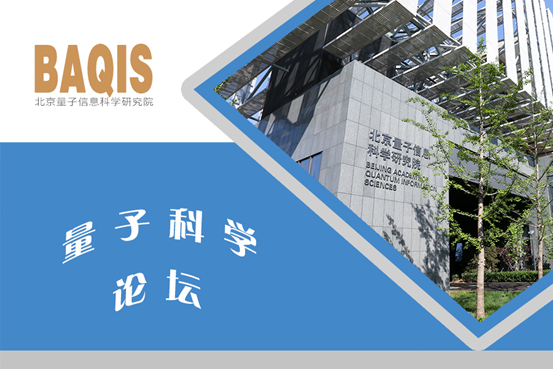BAQIS Quantum Science Forum 107: Simulating extremely anisotropic Heisenberg models in a Rydberg-atom array: from magnon bound state to Hilbert space fragmentation
2023/11/02

Date and Time: 2-Nov-2023 10am
Speaker: Fan Yang, University of Copenhagen
Host: Li You ( Tsinghua Univ. & BAQIS)
Title: Simulating extremely anisotropic Heisenberg models in a Rydberg-atom array: from magnon bound state to Hilbert space fragmentation
Venue: Room 526
Abstract:
The ability to manipulate elementary interactions in a many-body system is key for realistic quantum simulation. Recent progresses in systems of programmable atom arrays make Rydberg atoms promising candidates for quantum simulation, where intrinsic van der Waals interactions and dipole-dipole interactions are employed to simulate the quantum Ising model and the XY model. In Ref. [1], we propose a new paradigm for engineering Rydberg interactions, which allows us to access the extremely anisotropic regime of the Heisenberg model. Our recent analysis reveals that the model can be mapped exactly onto a modified version of the folded XXZ model, possessing U(1) symmetry of the total magnetization and the domain wall number, while exhibiting the strong Hilbert space fragmentation (HSF) [2]. The effective Hamiltonian has distinct time scales for the motion of a magnon and a hole, which allows for a continuous tuning from the integrable regime, to the Krylov-restricted thermal phase, and eventually to the statistical bubble localization region. As signatures of the HSF, we experimentally verify the kinetically constrained frozen dynamics and demonstrate the formation of a long-range magnon bound state [3]. The system can be further generalized to create chiral edge-mode bound pairs [4], which hold promise for the study of a chiral spin liquid.
[1] F. Yang, S. Yang, and L. You, Phys. Rev. Lett. 123, 063001 (2019).
[2] F. Yang, H. Yarloo, H. Zhang, K. M?lmer, and A. E. B. Nielsen, to appear on arXiv soon.
[3] K. Kim*, F. Yang*, K. M?lmer, and J. Ahn. arXiv:2307.04342, (2023).
[4] X. Wu*, F. Yang*, S. Yang, K. M?lmer, T. Pohl, M. K. Tey, and L. You, Phys. Rev. Research 4, L032046 (2022).
About the Speaker:
Fan Yang obtained his PhD degree from the Department of Physics at Tsinghua University, under the supervision of Prof. Li You. During his PhD studies (2015-2020), he has been focusing on theoretical investigation of quantum dynamics in AMO systems and won the highest award “Yu-Hsun Woo Prize” of the department. After the graduation, he joined Aarhus University (2020-2023) and University of Copenhagen (2023-) as a postdoc, conducting further researches with Prof. Klaus M?lmer. His current research interests include: (1) Quantum information processing with Rydberg atoms. (2) Light-matter interactions and quantum nonlinear optics. (3) Quantum many-body physics in driven-dissipative systems.
 中文
中文 Email
Email QCloud
QCloud Log in
Log in
